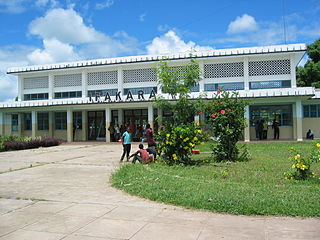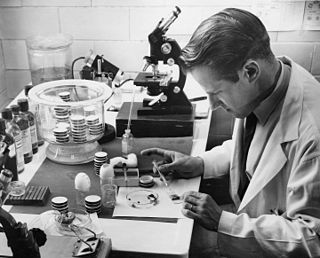
Novartis AG is a Swiss multinational pharmaceutical corporation based in Basel, Switzerland. Consistently ranked in the global top five, Novartis is one of the largest pharmaceutical companies in the world and was the fourth largest by revenue in 2022.

Assisted suicide means a procedure in which people take medications to end their own lives with the help of others, usually medical professionals. The term usually refers to physician-assisted suicide (PAS), which is an end of life measure for a person suffering a painful, terminal illness. Once it is determined that the person's situation qualifies under the physician-assisted suicide laws for that location, the physician's assistance is usually limited to writing a prescription for a lethal dose of drugs.

Charles Louis Alphonse Laveran was a French physician who won the Nobel Prize in Physiology or Medicine in 1907 for his discoveries of parasitic protozoans as causative agents of infectious diseases such as malaria and trypanosomiasis. Following his father, Louis Théodore Laveran, he took up military medicine as his profession. He obtained his medical degree from University of Strasbourg in 1867.

The University of Basel is a public research university in Basel, Switzerland. Founded on 4 April 1460, it is Switzerland's oldest university and among the world's oldest surviving universities. The university is traditionally counted among the leading institutions of higher learning in the country.

Emil Abderhalden was a Swiss biochemist and physiologist. His main findings, though disputed already in the 1910s, were not finally rejected until the late 1990s. Whether his misleading findings were based on fraud or simply the result of a lack of scientific rigor remains unclear. Abderhalden's drying pistol, used in chemistry, was first described by one of his students in a textbook Abderhalden edited.

The Liverpool School of Tropical Medicine (LSTM) is a higher education institution with degree awarding powers and a registered charity located in Liverpool, United Kingdom. Established in 1898, it was the first institution in the world dedicated to research and teaching in tropical medicine. The school has a research portfolio of over £220 million, assisted by funding from organisations such as the Bill & Melinda Gates Foundation, Wellcome Trust and Department for International Development (DFID).

Paul Hermann Müller, also known as Pauly Mueller, was a Swiss chemist who received the 1948 Nobel prize in Physiology or Medicine for his 1939 discovery of insecticidal qualities and use of DDT in the control of vector diseases such as malaria and yellow fever.

The Charité – Universitätsmedizin Berlin is Europe's largest university hospital, affiliated with Humboldt University and the Free University of Berlin.

Ifakara is a town in the Kilombero District, Morogoro Region, south central Tanzania. It is the headquarters of the Kilombero District administration and the main trading centre for Kilombero and Ulanga districts. The town is located near the Tanzania-Zambia Railway (TAZARA) line, at the edge of the Kilombero Valley, a vast swampland flooded by the mighty Kilombero River.

Wilhelm Burgdorfer was a Swiss-American scientist and an international leader in the field of medical entomology. He discovered the bacterial pathogen that causes Lyme disease, a spirochete named Borrelia burgdorferi in his honor.

The Swiss Tropical and Public Health Institute or Swiss TPH is an international global health institute working in various disciplines with a particular focus on low- and middle-income countries. It was founded in 1943 through the initiative of Rudolf Geigy. Swiss TPH endeavors to the improve the health of people in Switzerland and worldwide through research, education and services.
The Novartis Foundation is a non-profit organization and part of the corporate responsibility portfolio of Novartis in Basel, Switzerland. The foundation conducts projects to improve health, mostly in sub-Saharan Africa and in south-east Asia.

K. Srinath Reddy is an Indian physician and the Former President of the Public Health Foundation of India and formerly headed the Department of Cardiology at All India Institute of Medical Sciences (AIIMS).

The life sciences industry in Switzerland directly and indirectly employs about 135,000 people. It contributes 5.7% of the gross domestic product of Switzerland and 30% of the country's exports. In 2017 about 30% of Swiss exports were chemical products. In the same year Switzerland was the second largest exporter of packaged medicine in the world, with about 11% of the global total, worth $36.5 billion.
The Ifakara Health Institute (IHI) is a health research organization with offices in Ifakara, Dar es Salaam, Ikwiriri, Bagamoyo, and Mtwara, Tanzania. The institute conducts health-related research in a variety of areas, including malaria and HIV/AIDS.

The Human Development Innovation Fund is a UKAid financed 40 million British Pound challenge fund providing grants to businesses, NGOs and research institutions for scaling innovations focused on the quality, value for money, and sustainability of basic services in education, health and water, sanitation and hygiene (WASH). HDIF was launched on May 12, 2014 with the support of the Vice President of Tanzania.
Badri Nath Tandon was an Indian gastroenterologist, hepatologist, medical researcher and academic, and the Chairman and Senior Consultant of Gastroenterology, at Metro Hospitals and Heart Institute, Noida. He is a former Professor and Head of Department of Gastroenterology and Human Nutrition Unit at the All India Institute of Medical Sciences, Delhi (AIIMS) and a former Director and Senior Consultant of Hepatology and Gastroenterology at Pushpawati Singhania Research Institute for Liver, Renal and Digestive Diseases, New Delhi. He is a recipient of several awards including Sasakawa WHO Health Prize and Jubilee Medal of the RAMS. The Government of India awarded him the third highest civilian honour of the Padma Bhushan, in 1986, for his contributions to medicine.
Sentience Politics is a Swiss anti-speciesist political organization with the goal of reducing the suffering of non-human animals. Founded in 2013, their activities include political campaigns, such as ballot initiatives for sustainable food, fundamental rights for primates or a ban on factory farming.

Fredros Okumu is a Kenyan parasitologist and entomologist, who currently works as director of science at the Ifakara Health Institute (IHI) in Tanzania. His primary research interests concern the interactions between humans and mosquitoes.
Fred Newton Binka is a public health physician and researcher from Ghana. He serves as a distinguished professor of clinical epidemiology at the University of Health and Allied Sciences (UHAS) in Ho, Ghana, and has previously coordinated the World Health Organization (WHO) Emergency Response to Artemisinin Resistance in the Greater Mekong sub-region of Asia. He is the founding vice-chancellor of UHAS and the former executive secretary of the INDEPTH Network, a global network of health and demographic surveillance systems. His work in malaria control and health development in Africa, particularly in the areas of vitamin A supplementation, insecticide-treated bed nets, and rotavirus and meningitis vaccination, has been impactful.















